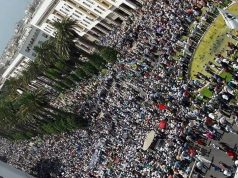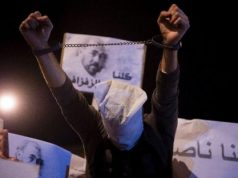[symple_box]
 Dr. Mohammed Maarouf is a Professor of Ethnography and Cultural Studies at Chouaib Doukkali University, Morocco. [/symple_box]
Dr. Mohammed Maarouf is a Professor of Ethnography and Cultural Studies at Chouaib Doukkali University, Morocco. [/symple_box]
El Jadida, Morocco—The Internet revolution has produced new social identities and relations our offline so-called postmodern world does not seem to be equipped thus far to deal with. The world has not yet assimilated how people, while connected, can melt into electric wires and cables that may transform their solid identities into plastic liquid data-based social cyborgs. The story of Simo and Rebecca is a good case in point. Why has Rebecca travelled to Morocco? Is a six-month virtual relationship enough to benumb Rebecca and put her on a so-called hasty secret flight to Morocco? The answer lies in the miracles the new technology ushers us into. The online world can domesticate the alien and radicalize the familiar; it dissolves cultural political and ideological boundaries between nations, religions and cultures. In the virtual world, domestic allegiances and restrictions may collapse in front of new strongly magnetic hypnotizing transnational allegiances. This is the social research that has to be vulgarized to the Average American to dissipate his fears from the mythic Other.
[symple_box color=”white”] ![]()
![]() Moroccans are famous for entertaining foreigners at home. Each one of us has a story to tell about entertaining a European or American at home. And many of them in my case still chronicle exotic and fabulous journeys they embarked on with me when I was of Adala’s age. [/symple_box]
Moroccans are famous for entertaining foreigners at home. Each one of us has a story to tell about entertaining a European or American at home. And many of them in my case still chronicle exotic and fabulous journeys they embarked on with me when I was of Adala’s age. [/symple_box]
Sgt Dunn, a spokesman for Clinton police, imagines “the worst-case scenario [for Rebecca] because of the turmoil in the world now,” and because it is a short-span internet relationship and “they do not know if the person is real.” Such media and police disoriented, choleric and passionate reports have unchained US dormant fears from the mythic Orient in the case of Rebecca’s short-term vacation to Morocco.
[symple_box color=”white”]![]()
![]() If Edward Said was alive, he would have written a sequel to his book on Orientalism and would have given it the title, “Moroccanism.” [/symple_box]
If Edward Said was alive, he would have written a sequel to his book on Orientalism and would have given it the title, “Moroccanism.” [/symple_box]
As one may notice, most reports portray the incident as an act of “kidnapping by distance.” Journalistic titles run as follows: “Fears for Teen in ‘Extreme Danger’ after flying to Morocco to meet ‘Facebook Friend’”/ Connecticut Teen Missing after Flying to Morocco to meet Facebook Boyfriend”. When you read American Media articles or watch their TV video clips, you are persuaded that a new tactic of Jihad is invented by imagined Muslim fighters overseas, and US is driven by panic as if they were earnestly compelled to forge new laws of protection. It seems that the Moroccan teenage Al Adala has put America on the alert by inventing a new Facebook tactic of “hypnotic kidnapping” that US investigators have to cope with.
What scandalizing and dismaying cultural stereotypes American media and authorities have unleashed against Morocco. If Edward Said was alive, he would have written a sequel to his book on Orientalism and would have given it the title, “Moroccanism.” Many American reports have referred to Morocco with the generic variation “North Africa.” Yes, we are indeed North Africa but we are different geographic spaces, different political systems, different cultures, different mother-tongues, different versions of Islam, and different cultural worldviews. We are so distinct social identities at home, let alone if we compare ourselves to our neighboring countries.
Such master narrative putting Islamic societies in one basket seems reductionist. As there are many Muslims, there are many versions of Islam in practice tied to the receptiveness of the cultural bed where they grow. Of course, no one can deny the recurrent cultural patterns Muslims may share because they are exposed to more or less to the same ideologies but the lived culture—the ethnographic aspect— of Islam is particular to the cultural bed where it is localized. Stereotyping Islam as generally ant-American and threatening US and European interests is but a serious cultural paranoid and distrust of Muslims that American Institutions have to exorcize inside, and a fantasy they are called to cure the rest of the population of. If the symptoms persist, Americans should travel like Rebecca to Morocco to participate in trance dances and ritual cure of jinn eviction to exorcize their fear of Muslim Jinns and return home in peace. Essaoiura, where Rebbeca was taking resort, is the cradle of Gnawi trance-dance music of possession!
Even in Arab countries where there is turmoil as the American police say, it is a matter of war, and these countries live special circumstances Europe and America have also historically witnessed, and we all know that they stem from economic and political injuries the population suffer under despotic undemocratic regimes albeit some official discourses may mediatize the conflict as an ideological war. It is a common platitude now to say that Arab wars are not revolutions. They are Uprisings for bread and human dignity. So, stigmatizing Muslims as natural or genetic forces of evil may actually endanger the safety of other Americans living in Muslim countries because common people may think that their race or sacred faith is under attack by the “infidel”. Hence, you are unaware feeding the “Monster”.
Some American media reports also cite governmental sources warning Americans about Morocco, being as unsafe and fraudulent, a real crude generalization addressed in some way to the Moroccan government to imbibe as if Jemaa el Fna Square in Marrakech is teeming with pickpockets and imposters. The image of Morocco as a country of fraudsters fixes the place in American popular imagination as an agglomeration of scattered inhabitants who lack moral and cultural foundations and social etiquette that may guarantee security for American tourists.
Moroccan social etiquette is actually epitomized in Moroccan hospitality. Simon’s convivial, cordial and generous reception to Rebecca from the moment her plane landed in Casablanca is a good case in point. She was entertained by the whole family. She was not chained, confined in incommunicado detention; or raped, or sliced into sausages as the American Media has frantically pushed the American citizen to imagine. The real danger the Media depicted has turned into a honeymoon on Essaouira beach with a teenage of her age. It is also a message to the Americans about the kind of ethnographic Islam our teenagers practice.
Moroccans are famous for entertaining foreigners at home. Each one of us has a story to tell about entertaining a European or American at home. And many of them in my case still chronicle exotic and fabulous journeys they embarked on with me when I was of Adala’s age. There is not one American who has been invited to a Moroccan home and has not tasted from the couscous dish. Many of them discover rolling the couscous into balls a real challenge, and want Moroccans to teach them the art without pressing so hard. Moroccans do not entrain their American guests with guns and bullets as the American media has insinuated about us except if the FBI investigators may take the Moroccan couscous balls for a new generation of explosives. Then so be it! You shell us with bombs in the Middle East; we shell you with couscous balls in Morocco!
White folks are living with us as our neighbors, colleagues at work and gym attendees. They share our apartment buildings, our public space, our Turkish baths, and our public administrations. How can we distinguish between an American and a European to target and kill following the American warning? How can we recognize who is British, who is Romanian, who is American with many nationalities speaking good English. Culturally speaking, Moroccans do not distinguish between nationalities. They treat them all as foreigners (gwer). And they deal with them on that basis entertaining them with a Moroccan hospitality unless they commit a breach of honor by making amorous passes to agnatically-related women. In this case, they may become unwanted guests and may be shunned by their hosts. White folks have also trespassed to collective popular hamams, an intimate masculine public space in the past esoteric to Moroccan males alone. Females use their own collective hamam. Now, it is a common setting to frequent for foreigners who like the Moroccan style of exfoliation. Last month, when I met an American in the Turkish Bath, he asked me to give him a small portion of the domestic soap we use before scrubbing (sabun l-beldi). He addressed me with the request: “can you please give me some black soap?” I glanced around and saw what he meant. What a beautiful translation to the cheap but healthy soap we wastefully use on our bodies and in scalping and polishing kitchen utensils junking the rest.
The U.S. state Department warns on its website that Americans traveling to Morocco should consider the “potential for terrorist violence against U.S. interests and citizens” and also “be wary of fraudsters.” This governmental warning has been a chestnut repetition in American media written and visual reports during Rebecca’s absence. It was about two o’clock after midnight when I was watching the news and searching the internet about Rebecca’s case. I was alone at home because my family was invited to break the fast with my in-law relatives. The place was silent and I was playing the videos listening again and again to such warnings, generalizations and fear-inspiring speeches by TV reporters about what could happen to Rebecca that I felt benumbed by the news and asked myself an ontological question: where am I? Am I still in Morocco, or have I wandered off to America? I wanted to be sure I was not hypnotized and kidnapped like Rebecca but in the contrary direction to Connecticut. I hurried to my window and peeped my head through. Indeed, it is my neighborhood and everything is calm and serene as usual. Because it was the small hours, the street was deserted, and you could only hear few whispers inside houses where some people were still awake. Then, I closed the window and went back to bed to sleep. I closed my eyes in slumber when I suddenly heard a strong explosion. Was it my closed-eye hallucination of a bomb? What happened? Oh! The American warnings are right, Morocco is under terrorist attack! It is not safe, my God! I ran to the window again, looked out fancying how many casualties could be chopped under the attack, I was expecting to hear a scramble of people, police and ambulance sirens! It was still calm and the dispersed echoes of whispers and smiles reached my ear behind the window curtains! So, what is it? Oh! My God it is normal! I remember! It is the sound of the cannon firing a blank shell that announces the time of (shur), the last meal before the start of the fast. It is Ramadan time in Morocco. I sat contemplating the media pressure on American citizens, and I pitied how they were scared of the other and turned into cultural dupes at the mercy of a regime of truth manipulated by top-down policies and ideologies.
It seems that the American cultural industry or mass culture manipulates social agents and strips them of any likely form of resistance. And if they ever dare to be involved, they can only be engaged as commodities in pseudo-resistance. They appear to live culturally unaware of power relations and ideologies, benumbed and helpless in front of cheap mass cultural temptations, defeated by commoditization, and inspired to consume while dispirited to protest; captured in the capitalistic labyrinths with a habit of amplifying imaginary fears, anxieties, and fantasies, which all may lead to cultural hallucinatory manipulations.
In a nutshell, I will relate to Rebecca the story of my visit to US for a conference in Louisiana. When I landed in Houston to take an internal flight to Baton Rouge, I was surprised to witness the cultural paranoid of the Americans in the airport. It was not only taking one’s shoes, belt and other outer garments at police security checks but also standing in long queues at border police offices to stamp one’s official entry to U.S territory. Though the police were charming and might entertain you with their own stories, I was annoyed by the loud voice nagging at one not to be far from one’s luggage otherwise, it would be seized and destroyed. When I went to the luggage claim, and collected my suitcase, I headed for the internal flight check-in desks to board the plane for Baton Rouge. I thought everything was organized in U.S. But to my dismay, it was not. The internal flights are like buses in Morocco. You have flights every thirty minutes and when they are full they can add an overload of two or three passengers and then take off. Unfortunately, it was one of my off days. I could not find a flight that evening to Baton Rouge, and I was told I should keep in the airport till six o’clock the following day, which would retard my presence in the conference. It seems that an American lady overheard my discussion with the check-in assistant and offered to help. She suggested we should fly to New Orleans, and her husband would then drive us to collect luggage from Baton Rouge airport, and then they could drop me at the hotel. She was very kind and I trusted her. Everything went as planned. The American family evinced the American example of hospitality and I returned home with a rectified image that there are Americans, perhaps a lot, who do not follow media stereotypes that treat Arabs as terrorists. What a memorable experience for you Rebecca in Morocco!
[symple_box]Please Note that the views expressed in all opinions on The Moroccan Times are the authors’s own and do not reflect The Moroccan Times editorial policy.[/symple_box]





